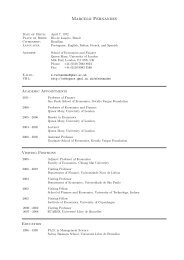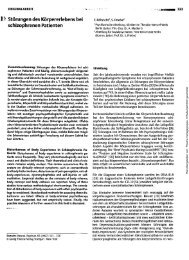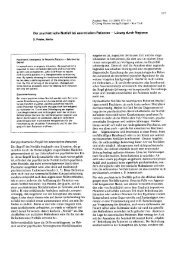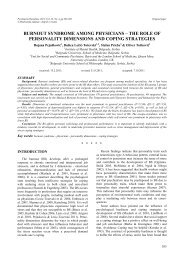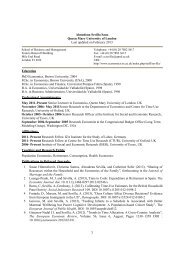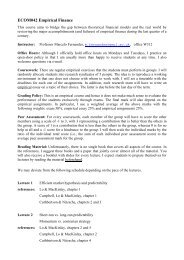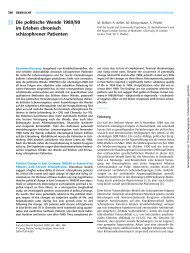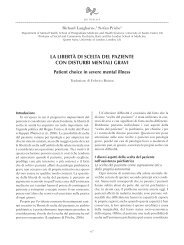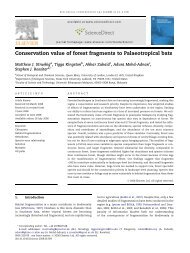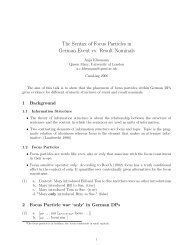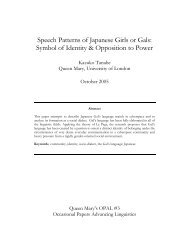Proofs - Personal Webspace for QMUL - Queen Mary, University of ...
Proofs - Personal Webspace for QMUL - Queen Mary, University of ...
Proofs - Personal Webspace for QMUL - Queen Mary, University of ...
Create successful ePaper yourself
Turn your PDF publications into a flip-book with our unique Google optimized e-Paper software.
6. Ego disorders in psychosis – transcultural or modern<br />
Western correlate <strong>of</strong> self experience?<br />
The question whether prerefl ective self- awareness can be<br />
conceptualized as a universal human trait and whether it can be<br />
altered in psychotic disorders is highly relevant <strong>for</strong> transcultural<br />
psychiatry and the diagnosis <strong>of</strong> psychotic disorders. So- called<br />
fi rst rank symptoms <strong>of</strong> schizophrenia (Schneider 1942) include<br />
“Ego disorders”, e.g. passivity phenomena such as thought<br />
insertion or alien thought control and experiences such as<br />
telepathy, i.e. the feeling that other persons can read one’s own<br />
thoughts. As such, they are characteristic, so- called “fi rst rank”<br />
symptoms <strong>of</strong> schizophrenia [54]. They describe a disturbance<br />
in a person’s awareness or knowledge <strong>of</strong> one’s thoughts or, as<br />
Karl Jaspers would put it: a procedural knowledge about our<br />
own thinking, to which – in contrast to the experience <strong>of</strong> outer<br />
objects – we have a privileged access [29]. Ego disorders are<br />
there<strong>for</strong>e distinguished from paranoid ideation, which concerns<br />
a misrepresentation <strong>of</strong> the meaning or implications <strong>of</strong> outer<br />
objects or processes to which patients and psychiatrists have<br />
equal access. The situation is different when a patient describes<br />
what is called “ego disorders”: it makes no sense to discuss with<br />
a person who describes that his thoughts are manipulated in<br />
his mind whether this experience is wrong – only the patient<br />
has a direct awareness <strong>of</strong> his own thoughts. It has been argued<br />
that one’s own thoughts are more closely connected with<br />
self- consciousness than the experience <strong>of</strong> one’s own body. For<br />
example, I may misidentify my own arm in case it is anesthetized<br />
and I fi nd myself – after an accident – within a heap <strong>of</strong> human<br />
beings, while this misidentifi cation is not possible with respect<br />
to my own thoughts [14].<br />
However, this argument may be wrong: in the example just<br />
reported, the anaesthesia <strong>of</strong> the arm is required <strong>for</strong> me to be<br />
able to misidentify it – however, this is a pathological condition<br />
which results from nerve dysfunction caused by the accident. In<br />
such a pathological circumstance, I may misidentify my own arm<br />
– just as I misidentify my own thought as alien or inserted by<br />
somebody else in the pathological state <strong>of</strong> psychosis. There<strong>for</strong>e,<br />
direct access may exist both to one’s own thoughts as to the<br />
representation <strong>of</strong> one’s own body, and as e.g. suggested by<br />
Metzinger, the phenomenal self- model may be maintained by<br />
continuous input <strong>of</strong> sensory and sensitive in<strong>for</strong>mation from the<br />
body [42]. Likewise, Schneider counted passivity phenomena<br />
concerning one’s own body parts (namely that they are e.g. under<br />
alien control) among his “fi rst rank symptoms” <strong>of</strong> schizophrenia<br />
– on an equal level with symptoms regarding alien thought control<br />
[54]. However, the claim that “my” thoughts are not really<br />
“my own” but instead “inserted” or “controlled” by someone<br />
else remains paradoxical in a way that “alien” control <strong>of</strong> visible<br />
objects (including visible body parts) is not: because how do I<br />
know that I suffer from inserted thoughts if they do not remain<br />
accessible and hence to some degree are still “my” thoughts?<br />
To explain apparently paradoxical experiences such as<br />
thought insertion in psychosis, several models have been<br />
developed that distinguish a sense <strong>of</strong> “agency”, “control” or<br />
“authorship” with respect to one’s own thoughts from “ownership”<br />
[17, 18]. However, to date the topic remains controversial.<br />
Moreover, can such symptoms be found in all cultures during<br />
the manifestation <strong>of</strong> schizophrenic psychosis and do they thus<br />
A. Heinz et al. / European Psychiatry 27 (2012) / supplement n°2 / S32-S43 S37<br />
represent a common human quality <strong>of</strong> self- experience or does<br />
culture infl uence the way <strong>of</strong> attributing control over one’s own<br />
thoughts or body? A study <strong>of</strong> the WHO suggested that fi rst rank<br />
symptoms can be found in all (examined) cultures independent<br />
<strong>of</strong> the degree <strong>of</strong> industrialisation, and that schizophrenic psychosis<br />
appear with comparable frequency in different cultures,<br />
specifi cally when schizophrenia is diagnosed using Schneider’s<br />
traditional concept <strong>of</strong> fi rst rank symptoms [50]. On the other<br />
hand, ethnologists like Fortes and Mayer (1969) suggested that<br />
schizophrenic psychosis was not found in a traditional setting<br />
in Ghana but appeared once young men entered large cities<br />
as migrant workers [13]. Also, the German psychiatrist Wulff<br />
described that in the 1960s in Vietnam, he could not fi nd ego<br />
disorders in schizophrenic psychosis [24]. He explained this<br />
fi nding with the structure <strong>of</strong> the local language: a speaker in<br />
Vietnam would not refer to himself as “I” but instead name his<br />
social status, <strong>for</strong> example, he would address himself as a father,<br />
older brother etc. An abstract, common denomination <strong>for</strong> any<br />
actor would only be found in love poems, in which the speaker<br />
wants to express his deepest despair, namely being reduced to<br />
the universal characteristic <strong>of</strong> any personal existence – to be a<br />
“slave <strong>of</strong> the king”, a state shared by all Vietnamese regardless<br />
<strong>of</strong> their social status [24]. It could be argued that such linguistic<br />
peculiarities only concern different ways <strong>of</strong> expressing (fundamentally<br />
similar) individual experiences; however, some<br />
authors such as Müller (1981) referred to Whorf’s linguistic<br />
studies and suggested that linguistic structures indeed interact<br />
with personal experiences [44]. For example, among Native<br />
Americans such as the Sioux, experiences are <strong>of</strong>ten expressed<br />
in the passive voice, which refl ects a feeling <strong>of</strong> being affected by<br />
environmental constellations rather than being a determined<br />
actor within these circumstances. Also in Homers “Ilias” and<br />
“Odyssey”, it is not the individual person but rather the Olympic<br />
gods that stir up the anger in a subject or calm him down in<br />
time to avoid an active fi ght. The actions <strong>of</strong> the heroes <strong>of</strong> these<br />
stories can thus rather be attributed to such divine <strong>for</strong>ces and<br />
not to individual intentions. Of course one can ask whether<br />
these are just poetic expressions <strong>of</strong> human experiences, which<br />
otherwise do not differ from our modern experience <strong>of</strong> the self.<br />
However, several fi ndings suggest that our current Western way<br />
<strong>of</strong> experiencing and conceptualising our self is based on historically<br />
unique experiences and that concepts <strong>of</strong> mental disorders<br />
such as schizophrenia, which is characterized by ego disorders,<br />
require elaborate and widely accepted concepts <strong>of</strong> the self and<br />
<strong>of</strong> self- control. Only if a majority <strong>of</strong> subjects observe their own<br />
behaviour and agree that they are indeed in active control <strong>of</strong> their<br />
own thoughts and that the “I think” can accompany any <strong>of</strong> their<br />
mental representations, can the loss <strong>of</strong> such an ability be used<br />
as a pathological symptom that indicates “ego disorder” [52].<br />
Indeed, the fi rst description <strong>of</strong> schizophrenic psychosis in modern<br />
times can be found in England at the end <strong>of</strong> the 18th century,<br />
when a patient described how his thoughts were controlled by<br />
machines [39]. The hypothesis that cultural factors infl uence the<br />
way we observe ourselves and the signs and symptoms we use<br />
to diagnose a disorder is supported by the above quoted study <strong>of</strong><br />
Fortes and Mayer (1969), who observed that among the Tallensi<br />
<strong>of</strong> Northern Ghana, schizophrenic psychoses were only described<br />
when the young men left their traditional surroundings and<br />
worked as migrants in the new colonial cities [13].<br />
<strong>Pro<strong>of</strong>s</strong>



